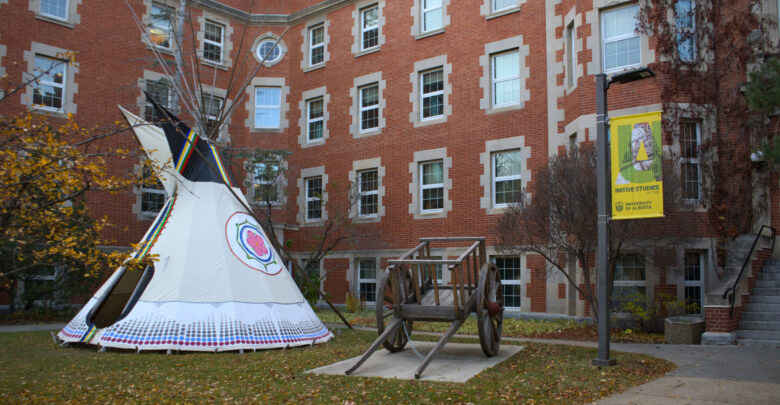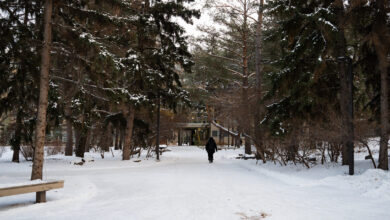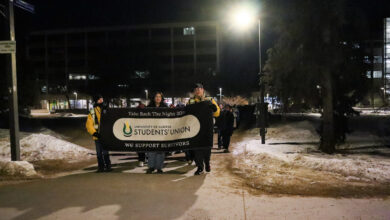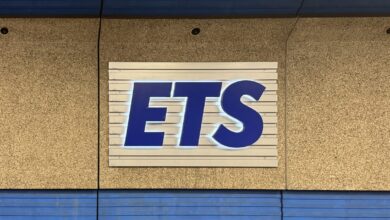Only Native studies councillor candidate disqualified from UASU by-election
Denee Reansbury, the 2024–25 Native studies councillor, was disqualified for missing the mandatory candidates meeting.
 Leah Hennig
Leah HennigDenee Reansbury served as the Native studies councillor for the 2024–25 year on the University of Alberta Students’ Union (UASU) Students’ Council. When she ran in the by-election this October, she was disqualified for missing the mandatory candidates meeting.
Reanbury was the only candidate running for the Native studies seat on council in the 2025 by-election. Historically, the seat has been hard to fill.
Megan Garbutt, the UASU’s chief returning officer (CRO), disqualified Reansbury for missing the mandatory candidates meeting on September 24.
Reansbury told The Gateway she had an exam that overlapped with the candidates meeting, in addition to having to take care of her children. Reansbury is a single mother of two boys.
Exemption to candidates meeting attendance not granted
Garbutt had received Reansbury’s nomination package for the fall by-election on September 23, after the nomination deadline was extended for the Native studies faculty from September 22 to September 24, according to Garbutt’s submission to the Discipline, Interpretation, and Enforcement (DIE) Board.
She found Reansbury was eight signatures short of the required amount and notified her at 9:33 p.m. on September 23 that she would need to submit her package by the next day .
Garbutt notified Reansbury that her nomination package had been received on September 24 at 4:10 p.m.. The candidates meeting was scheduled for the same day at 6:00 p.m..
The UASU’s bylaws state in 320.08 section 02.04 that if the nomination deadline is extended, the CRO shall hold an additional candidates meeting for new candidates. There was no additional candidates meeting.
The UASU bylaw 320.08 also states that candidates can be exempt from attending the candidates meeting under specific circumstances.
One circumstance is requesting an exemption, which may or may not be approved by the CRO, at least 48 hours in advance. Garbutt sent an email to Reansbury with information about the meeting 21 hours in advance.
Reansbury said this wasn’t sufficient time to move her exam or arrange childcare for her children. She told The Gateway that she had planned to ask for an exemption, but couldn’t because it wouldn’t have been 48 hours in advance of the meeting.
Alternatively, the bylaw states that candidates may miss the meeting due to unforeseen academic obligations or an emergency for which no notice could be given.
The UASU bylaws also state that the CRO shall grant an exemption if the candidate has been nominated in accordance with bylaw 320.07. That section of the bylaws outline the regular requirements for a candidate’s nomination.
Reansbury’s appeal to the DIE Board’s decision failed
Garbutt submitted a request to the DIE Board for interpretation of the situation and the application of the exemptions on September 26.
In an email shared with The Gateway, Garbutt told Reansbury that she submitted a request for DIE Board interpretation because “I want to give you a chance to participate in this election, but as per my job, my hands are tied by bylaw.”
The DIE Board ruled that Reansbury’s circumstances did not fall under the bylaw’s exemptions.
“The candidate indicated that they were in an exam on September 24, 2025, however, it is unclear that this would interfere with the candidate meeting on the same day at 6:00 p.m.. In addition, the candidate did not give indication that there was an emergency in which no notice could have been given,” the ruling stated.
Reansbury appealed the DIE Board’s decision. She contested that she had received proper notification of the meeting. Additionally, Reansbury said that her exam and childcare responsibilities prevented her from attending, which she says she was transparent about.
The board ruled that Reansbury’s exam did not meet the requirements to be considered an unforeseen academic circumstance. It also said in its ruling that her childcare responsibilities did not constitute an unforeseen emergency which she could not have given notice for.
Reansbury feels the CRO should have been granted her an exemption because the UASU didn’t follow their own bylaws.
The DIE Board did not appeal its original ruling.
“I wish I could give all the notice in the world,” Garbutt says
In an interview with The Gateway, Garbutt said she did not have discretion to change the date of the candidates meeting or the nomination deadline.
She said that the email sent on September 23 at 9:51 p.m. welcoming new candidates and providing information about the candidates meeting was “an extra measure [she made] to make sure everyone was aware of it.”
Garbutt said the date of the meeting was available in the nomination package so there was more than 21 hours notice.
When asked about not confirming that she had received Reansbury’s nomination package until the day before the meeting, Garbutt said she had never told Reansbury that she wasn’t a candidate.
Garbutt also said Reansbury had told her she might have to bring her children to the meeting and Garbutt had provided her with an online link to the meeting as well.
“Typically, we just have the candidates meeting in-person, but that was kind of another way I wanted to ensure accessibility for candidates,” Garbutt said.
Garbutt also said that Reansbury had mentioned her exam in passing, but “that was never initially made clear to [her]” if it would interfere with the meeting.
“I wish I could give all the notice in the world, but at the end of the day I only knew what candidates were running about 30 hours before the candidates meeting,” Garbutt said. “Everything does move really fast and that’s just kind of how it goes with the by-election.”
Indigenous representation falls on Native studies councillor
Reansbury said she originally ran for council because she found out that the Native studies seat had been vacant for a long time.
“We’re already a tiny faculty and we should have people there to represent us because unfortunately, the [UASU] doesn’t have an Indigenous specific person so it falls on us to always represent that voice,” Reansbury said.
Reansbury said that due to treaty rights and the UASU’s own initiatives, there’s supposed to be Indigenous representation in governance. But now there’s not.
Reansbury was also the only Indigenous person sitting on the Aboriginal Relations and Reconciliation Committee (ARRC). As she’s no longer a councillor, there is no Indigenous representation on ARRC.
The Gateway requested an updated list of ARRC members and confirmation of how many ARRC meetings there have been in the last year from the UASU. The Gateway did not receive a response before publication.
The UASU’s archived meeting agendas show only three meetings occurred in the 2024–25 year, and no meetings as of the time of publication for the 2025–26 year.
In what turned out to be Reansbury’s last council meeting on September 23, she gave a speech about the UASU needing to represent Indigenous people.
“As executives, you’ve had months to implement the ARRC recommendations for this council. I have reminded people on several occasions, but the most basic gestures of respect, such as offering a smudge, or inviting an Elder, each of those have been overlooked,” Reansbury had said in her speech to council.
“The blanket exercise, which should have been mandatory years ago, has not been held in several terms. Each time I’ve asked why, I’ve been told that no facilitator could be found, yet I’ve personally identified several people who could lead this.”
According the UASU bylaw 110.18, the Council Administration Committee is required to schedule a KAIROS blanket exercise after the general election in March.
“Time for excuses is over, the responsibility is here and it is yours. Do not leave the work of injustice to Indigenous people alone. Rise to it, and show this council can be more than words,” she said at council.
Dissatisfaction with the implementation of ARRC recommendations
Reansbury told The Gateway that she doesn’t believe that the UASU genuinely cares about Indigenous representation. She also expressed that she hasn’t seen the UASU act on the ARRC recommendations.
On the UASU website that tracks the progress on ARRC recommendations, most are marked as “substantially complete” or “perpetual priority.”
Some of the ARRC recommendations are to advocate for expanded childcare access and create a Students Who Parent Policy. Notably, the U of A is ending its funding to on-campus childcare services in January 2026.
Although at GovCamp councillors did tobacco ties, Reansbury didn’t feel that was enough.
“How can you consider that to be any sort of Indigenous programming? The only thing you’re teaching them is tobacco ties, something that we teach our children to do,” she said. “And you don’t explain how to do it properly, how to gift them to people.”
She said that she has tried to encourage more people to take part in governance, but many don’t feel there’s any point because they don’t feel listened to.
Reansbury said she’s raised concerns to UASU executives about barriers students who parent face when trying to participate in governance.
The Gateway asked UASU President Pedro Almeida for a response to these concerns and how the UASU will approach the inclusion of Indigenous voices going forward. Almeida provided comment over email, stating that “we certainly need Indigenous representation in student leadership and I would say that we are actively working on it.”
He also referred to bylaw 200, which states that the UASU shall consult Indigenous students on matters that impact Indigenous students “in a manner materially distinct from how they impact students at large.”
Almeida also wrote that the UASU would be eager to see some of the vacant seats on council filled by Indigenous students through the vacancy petition process.
Concerns over a conflict of interest with the CRO
Reansbury added that she doesn’t feel that Garbutt should be the CRO as she has a romantic relationship with Almeida. She said she voiced her concerns about this when the UASU was hiring a new CRO, but her concerns were dismissed.
The Gateway asked Garbutt about this and she said “the only time where [Almeida and Garbutt] really cross paths is at council meetings, and even then it’s only when there’s voting or election-related things happening.”
She also said Almeida abstains from votes on election-related matters and they have disclosed the conflict of interest.
“I don’t personally see how it would conflict with this specific situation,” Garbutt said in the interview with The Gateway.
When asked how she keeps feelings about people who may criticize Almeida separate from her professional decisions, Garbutt said “[Almeida] and I keep our personal lives and professional lives very separate.”
“Coming into this job, I was very clear that in this role, I really want to make sure that my personal feelings aren’t really ever getting in the way,” Garbutt said.
She said she was unaware of Reansbury’s criticism of Almeida and the current executive team.
In a comment provided over email, Almeida emphasized that the CRO’s office works independently from the executive team.
He also said that “if any candidate feels one of the CRO’s decisions is incorrect, they are always welcome to appeal it to the DIE Board … which in this case, I believe was done, and the DIE Board ruled that the appeal was unsuccessful.”




